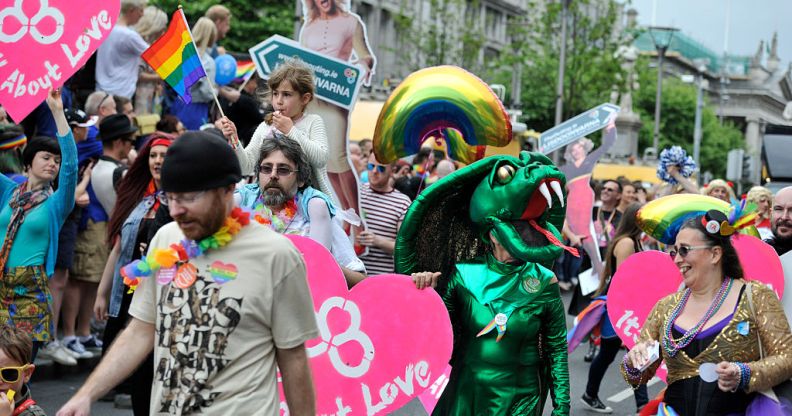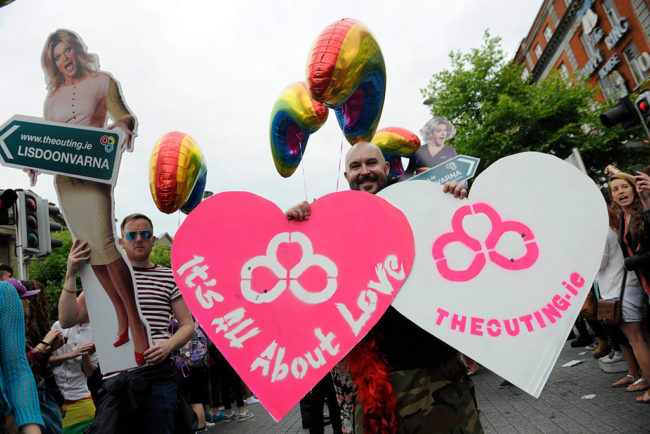Uniformed police to march in Dublin Pride for first time

Clodagh Kilcoyne/Getty
Uniformed members of Ireland’s police force, An Garda Síochána, will march in this year’s Dublin pride parade for the first time ever.
Garda commissioner Drew Harris told officers at an annual conference yesterday that they would march in the parade, according to TheJournal.ie.
“As you are all aware, society is becoming increasingly diverse,” Harris said.
“As the [Garda Representative Association] has rightly pointed out, it is essential that An Garda Síochána reflects the diverse society we serve.”
He confirmed that some uniformed members would be marching in the parade, which is set to take place on June 29.
Jed Dowling of Dublin Pride said in a statement today (May 1) that they were “delighted” that uniformed Gardaí would take part in the parade and thanked the Garda Commissioner for his support.
“In 2017 members of An Garda Siochana and the PSNI marched together in Belfast Pride in what was a symbol, not only of how far the LGBT community has come but also how far all communities on our island had come in a fight for tolerance, respect, and equality,” Dowling said.
“These past few weeks have taught us that we need symbols like these, not just for ourselves but for all communities in Ireland. We want Dublin Pride’s return to O’Connell Street to be the most inclusive event possible and the one that defines not only who we as a country are, but who we want to be.”
Meanwhile, Eddie McGuinness of Dublin Pride said that they are working with G-Force, an LGBT+ Garda employee group, for the parade.
The decision to allow officers to march in Dublin Pride has divided the LGBT+ community
The decision has caused division within Ireland’s LGBT+ community. Some have applauded the decision while others have been critical.
One Twitter user, @lessofabeing, commented: “Dublin Pride originated as a protest against the refusal of Gardaí to investigate homophobic hate crimes around the country. No cops at Pride, ever.” The tweet has been liked more than 2,000 times.
Another user, @5_niamh, wrote: “If you think having gardaí at pride is at all okay you are wrong. Having Gardaí there is an insult to the LGBTQ+ community. It’s not ‘progressive’ or ‘breaking barriers’ it’s stomping all over our history and making us feel uncomfortable and unsafe.”
“As the GRA has rightly pointed out, it is essential that An Garda Síochána reflects the diverse society we serve.”
– Garda Commissioner Drew Harris
Somebody else (@motherofnaggins) said: “The Gardaí as an institution work for the state that has historically oppressed, punished, & ostracised LGBTQ+ people so their presence at pride should not be prioritised over that of minorities (esp. LGBTQ+ people who don’t feel safe around them.”

Clodagh Kilcoyne/Getty
Others defended the decision. One user, @Nisior23 said: “Not allowing our Gardaí to march in solidarity with us only creates a larger divide within our society. I am so happy for all the hard working, kind and genuine Gardaí who are LGBT and will now get to feel accepted at Pride.”
Another said: “Okay unpopular opinion time. I’m happy that the Gardaí are marching at Pride. I understand the history I do, and I know my reasons are personal, but I can’t see how this is bad in our modern society.”
Meanwhile, Queer Action Ireland, an LGBT+ organisation, condemned the decision in a statement released today (May 1) to PinkNews.
“There are a multitude of issues with police participation in Pride, but in particular on the 50th anniversary of the Stonewall Riots—such a pivotal moment in the history of queer struggle.
“Queer liberation is not LGBTQ+ police. Queer liberation is the dismantling of the institutions of power that seek to oppress us. We will never welcome a Garda presence at Pride in Dublin or anywhere else, and call on other organisations to resist their participation.”
Police marching in pride parades has caused controversy in other parts of the world
Police marching in pride parades has caused controversy in other parts of the world in recent years.
Last year, Auckland Pride organisers announced that police officers would not be allowed to march in uniform in the next parade.
“Whilst there is goodwill towards the NZ Police, as an institution they do not currently meet the degree of safety and awareness of intersectionality required by our rainbow communities,” they said in an announcement.
Meanwhile, in Canada, Pride Toronto banned police officers in uniform from their marches in 2017 and 2018.
Last August, police officers who were due to march in a pride parade in Madison, Wisconsin, were later told that they would no longer be welcome.
In Belfast, police officers have been marching in uniform in the pride parade for the last two years.

